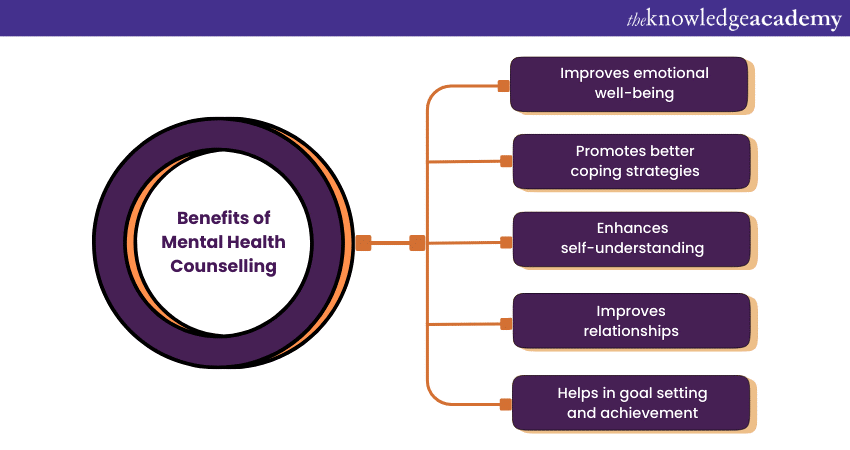How Mental Health Counseling can Save You Time, Stress, and Money.
How Mental Health Counseling can Save You Time, Stress, and Money.
Blog Article
Rumored Buzz on Mental Health Counseling
Table of ContentsAll about Mental Health Counseling8 Simple Techniques For Mental Health CounselingHow Mental Health Counseling can Save You Time, Stress, and Money.Indicators on Mental Health Counseling You Need To KnowSome Ideas on Mental Health Counseling You Need To Know
Via treatment, you can obtain understanding right into your own patterns of habits and communication, which can result in more fulfilling and pleasing partnerships with friends, family, and enchanting companions. What we believe, we materialize. If you're taken in with negative emotions and adverse ideas that are interfering with your life, treatment can assist., or there are various other unfavorable ways you act. Therapy can help you modify those habits that are having a negative influence on your world and partnerships.

The significance of therapy surpasses your psychological wellness. Obtaining treatment to deal with particular elements of your life can aid you be a lot more productive in various other locations, including job. Some research has actually even revealed that there's a direct relationship in between seeking psychological health aid and a decrease in missed out on work.

The Single Strategy To Use For Mental Health Counseling
There are also extra advantages of treatment than just the ones we have discussed., or build partnerships (enchanting or those with family members or good friends) in a healthy and balanced method.
For the function of the present study, regarded advantages and barriers to mental wellness help-seeking are being discovered. Previous research study discovered that perceived obstacles have a substantial result on college students' health actions options (Von Ah, Ebert, Ngamvitroj, Park & Kang, 2003). Perceived advantages and barriers to help-seeking were especially picked because of their influence on decision-making and inevitably action (Glanz, Rimer, & Su, 2005).
Today research seeks to examine whether or not stigma functions as a barrier to treatment amongst university student. Eisenberg et al. (2011) suggested that hesitation concerning therapy efficiency is one more obstacle to joining treatment. Research study findings exposed that university student endorsed numerous barriers to joining treatment. Mental Health Counseling. Amongst these were: (1) preferring to take care of mental illness themselves, (2) not having sufficient time to take part in treatment, (3) inquiries about whether psychological health treatment is reliable in remediating issues, (4) an idea that stress is typical or the trouble will obtain better without treatment, (5) absence of money, and (6) fret concerning what others would believe if they discovered therapy engagement.
(2006) reported similar variables as obstacles to looking for treatment and also found that a mistrust of companies may hamper pupils from looking for aid. Staff in campus mental university hospital might be regarded as hostile, and long wait times for solutions might be "repulsive" for pupils. Variables assisting in extra favorable attitudes are frequently at the opposite pole of those elements recognized as obstacles.
Not known Factual Statements About Mental Health Counseling
One in three (34.6%) reported surviving on campus and one in four (23.3%) reported coping with parents. Virtually fifty percent of students were entailed additional info in campus companies and 1 in 10 reported remaining in a fraternity or sorority. Greater than one-third of trainees (38.1%) reported that they had a relative or pal with a diagnosed psychological health and wellness problem.

Mental Health Counseling Fundamentals Explained
Univariate F-tests determined specific subscale things that dramatically differed. Women were much less most likely than males to view people that most likely to counseling as psychologically weak, people that most likely to counseling as insane, to her explanation really feel that people with psychological illness ought to manage issues by themselves, that individuals that go to counseling as not able to resolve troubles, that people that go to therapy slouch, and to really feel that individuals who most likely to therapy are different from typical individuals in a negative way.
Similarly, research results disclosed that women were considerably less most likely than men to hold stigma-related attitudes. This follows previous research study which likewise found that males hold higher degrees of regarded preconception than ladies (Chandra & Minkovitz, 2006). Based upon research study searchings for, it is apparent that men might be less likely than ladies to seek treatment as a result of low viewed obstacles in addition to high stigma-related perspectives.
Unknown Facts About Mental Health Counseling
In enhancement, university health and wellness professionals might use academic programs targeting males with details on the advantages of mental health therapy and the significance of seeking aid when required., the present research discovered no considerable differences in the number of viewed barriers to help-seeking behaviors based on sex.
Scientist hypothesize that this is website link primarily as a result of conventional social norms and sex roles that identified males based upon toughness and lack of emotional expression (Addis & Mahalik, 2003; Ang, Lim, Tan, & Yau, 2004; Mojtabai, 2007). Overall, there have actually been mixed results among the college trainee populace pertaining to sex differences (Rosenthal & Wilson, 2008). This finding was unexpected and might highlight that those who had gotten therapy had a much better concept of delay times and various other "accessibility" obstacles that might make it difficult to begin treatment. Perhaps, participants who have received counseling view much more barriers than participants who have not received counseling considering that seeking counseling solutions once again could involve worry of self-disclosing personal information to a new counselor.
Report this page